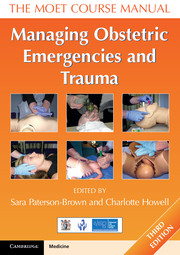Book contents
- Frontmatter
- Dedication
- Contents
- Working Group
- About the authors
- Acknowledgements
- Abbreviations
- Section 1 Introduction
- Section 2 Recognition
- Section 3 Resuscitation
- Section 4 Trauma
- Section 5 Other medical and surgical emergencies
- Section 6 Obstetric emergencies
- Section 7 Triage and transfer
- Section 8 Human issues
- 41 Human factors
- 42 Consent matters
- Index
42 - Consent matters
- Frontmatter
- Dedication
- Contents
- Working Group
- About the authors
- Acknowledgements
- Abbreviations
- Section 1 Introduction
- Section 2 Recognition
- Section 3 Resuscitation
- Section 4 Trauma
- Section 5 Other medical and surgical emergencies
- Section 6 Obstetric emergencies
- Section 7 Triage and transfer
- Section 8 Human issues
- 41 Human factors
- 42 Consent matters
- Index
Summary
Objectives
On successfully completing this topic you will be able to:
understand when and why consent is required
appreciate the concepts of validity, capacity, autonomy and responsibility
understand the legal status of the fetus.
When is consent required?
Consent is required before any treatment, investigation or physical contact with a patient is undertaken. Consent is also required before involving patients in research, teaching or disclosure of confidential information (which may be written, pictorial or auditory).
In England and Wales there is no statute, as in some countries, stating the principles of consent. Failure to obtain informed consent may give rise to civil or criminal proceedings as any touching of the person, no matter how well intentioned, is a trespass. However, to protect against a claim of battery, consent only in the broadest terms has to be obtained.
By contrast, a much more demanding obligation to obtain informed consent arises from a duty of care to the patient by the health professional.
Failure to provide sufficient information prevents a patient making an informed choice. If, as a result, the patient agrees to a procedure she would have refused had she been fully informed and harm arises as a result, there would be grounds for a claim of negligence (even if the harm is a recognised hazard of the procedure rather than the product of poor management).
- Type
- Chapter
- Information
- Managing Obstetric Emergencies and TraumaThe MOET Course Manual, pp. 481 - 492Publisher: Cambridge University PressPrint publication year: 2014

